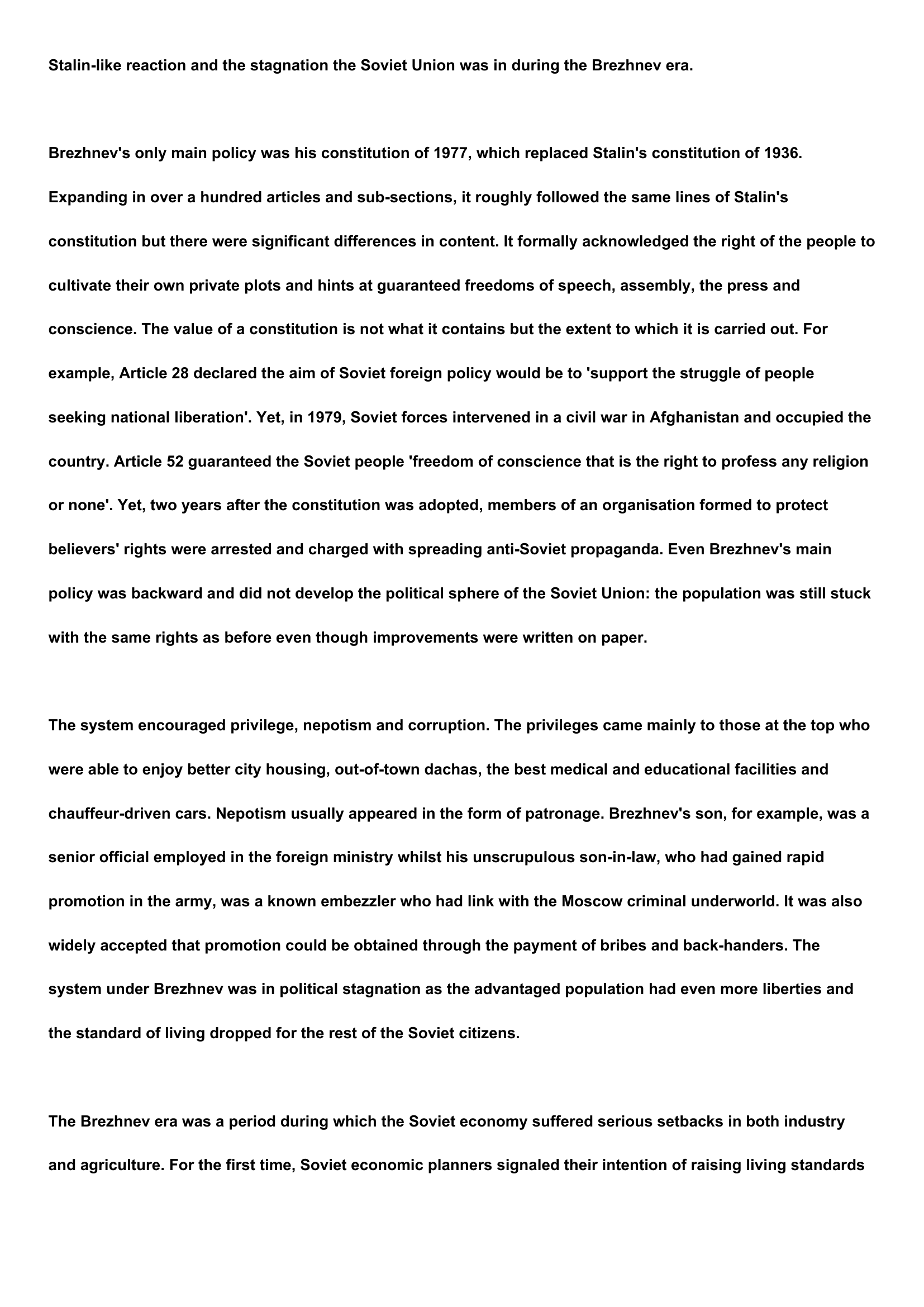A period of political and economic stagnation. How valid is this assessment of the Brezhnev years?
Publié le 24/09/2012

Extrait du document
«
Stalin-like reaction and the stagnation the Soviet Union was in during the Brezhnev era.
Brezhnev's only main policy was his constitution of 1977, which replaced Stalin's constitution of 1936.
Expanding in over a hundred articles and sub-sections, it roughly followed the same lines of Stalin's
constitution but there were significant differences in content.
It formally acknowledged the right of the people to
cultivate their own private plots and hints at guaranteed freedoms of speech, assembly, the press and
conscience.
The value of a constitution is not what it contains but the extent to which it is carried out.
For
example, Article 28 declared the aim of Soviet foreign policy would be to 'support the struggle of people
seeking national liberation'.
Yet, in 1979, Soviet forces intervened in a civil war in Afghanistan and occupied the
country.
Article 52 guaranteed the Soviet people 'freedom of conscience that is the right to profess any religion
or none'.
Yet, two years after the constitution was adopted, members of an organisation formed to protect
believers' rights were arrested and charged with spreading anti-Soviet propaganda.
Even Brezhnev's main
policy was backward and did not develop the political sphere of the Soviet Union: the population was still stuck
with the same rights as before even though improvements were written on paper.
The system encouraged privilege, nepotism and corruption.
The privileges came mainly to those at the top who
were able to enjoy better city housing, out-of-town dachas, the best medical and educational facilities and
chauffeur-driven cars.
Nepotism usually appeared in the form of patronage.
Brezhnev's son, for example, was a
senior official employed in the foreign ministry whilst his unscrupulous son-in-law, who had gained rapid
promotion in the army, was a known embezzler who had link with the Moscow criminal underworld.
It was also
widely accepted that promotion could be obtained through the payment of bribes and back-handers.
The
system under Brezhnev was in political stagnation as the advantaged population had even more liberties and
the standard of living dropped for the rest of the Soviet citizens.
The Brezhnev era was a period during which the Soviet economy suffered serious setbacks in both industry
and agriculture.
For the first time, Soviet economic planners signaled their intention of raising living standards.
»
↓↓↓ APERÇU DU DOCUMENT ↓↓↓
Liens utiles
- These poems explore encounters between the speaker or a character and a force that is greater than he is – How do the poets develop and contemplate this experience? Refer to the details of language and effect as you compare these poems.
- Synthèse Mythes & Héros – Lucas Pierru TS4 During this sequence, we studied the notion of Myth and heroes.
- Nelson Mandela's Inaugural Address Nobel Peace Prize winner and former political prisoner, Nelson Mandela, was elected president of the Republic of South Africa in April 1994 in the country's first multiracial elections.
- Franklin Roosevelt's Pearl Harbor Speech In this famous speech, President Franklin Delano Roosevelt lists the unprovoked attacks by Japan and details America's reasons for declaring war.
- Cockroach Cockroaches are one of the oldest insects on Earth and look about the same as they did millions of years ago.

































